Update your browser for more security, speed and the best experience on this site.
The Golden Retriever
Golden Retrievers are gentle creatures known for their friendly disposition, devotion, and obedient nature. They make wonderful family companions and generally enjoy children.
Goldens are active dogs with a powerful physique, but can be easily distracted during training. However, they are eager to please and enjoy learning. Goldens especially enjoy games that involve retrieving and love to carry toys and other items in their mouths.
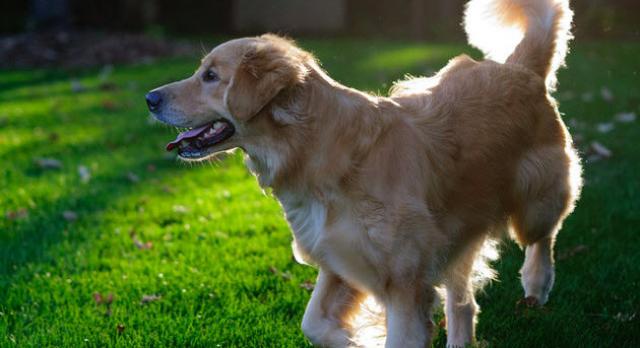

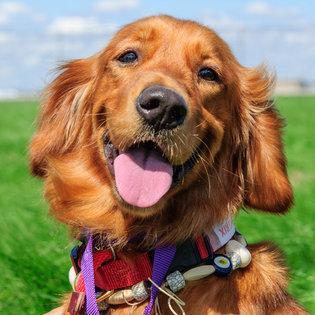
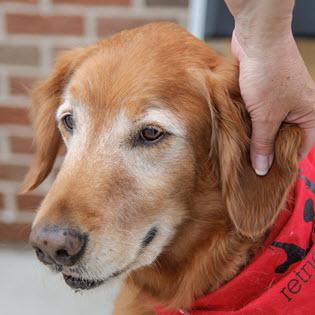
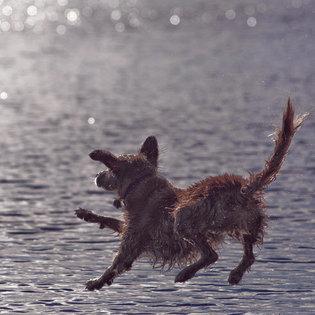

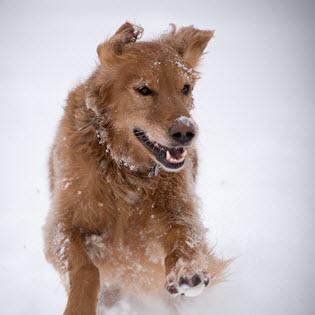
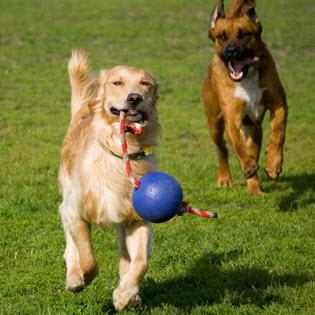
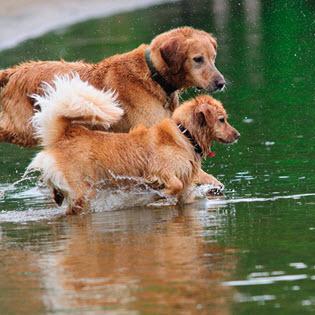
 Golden Retriever Facts
Golden Retriever Facts
- The Golden Retriever has a double coat. The outer coat is dense and water repellent, while the inner coat is warm and wooly. Feathering appears on the undercarriage, legs, and tail.
- Coat color ranges from cream to a dark red hue.
- The Golden Retriever needs daily exercise and human interaction. Obedience lessons, active games, or retrieving sessions are all good ways to exercise the Golden’s mind and body.
- The Golden Retriever is not intended to live as an outside dog. They are very people-oriented and are miserable when separated from those they love. A lonely Golden may bark incessantly, dig up the backyard, or continuously escape to roam the neighborhood.
- Males typically weigh 65 – 75 pounds, and females range from 55 – 65 pounds.
 Golden Retriever FAQs
Golden Retriever FAQs
The wonderful temperament of a Golden Retriever is the hallmark of the breed. They are social dogs who are friendly, reliable, and trustworthy. They have athletic good looks with a robust body and an alert disposition.
Golden Retrievers have friendly brown eyes and a lustrous coat that can vary from creamy yellow to a deep, golden red and may be straight or wavy with natural feathering on the neck, legs, and tail.
Goldens come from a working background, and they thrive on daily physical and mental activity. They are avid retrievers and will frequently pick up shoes, socks, towels, or whatever they can fit in their mouths. They love to play tracking/retrieving games and can sniff out their toys hidden about the house.
They are avid swimmers and will retrieve balls and toys longer than you can physically throw them! Romping with other dogs is great exercise. They also enjoy cooling off in a “kiddie” swimming pool in the back yard on hot summer days.
Golden Retrievers will become overweight very quickly without adequate exercise—letting your dog out for potty breaks is not considered exercise.
You do need to be careful exercising your Golden under the age of 9 months old. They need exercise but it should not be forced. They will run and play until their tongue hangs out, which is their way of saying they’ve had enough.
You should not go jogging with a young dog; wait until they are fully grown so you don’t damage their joints.
Most Goldens are wonderful with children; however, when they are young and full of energy they can easily knock small children down from excitement. It is important not to leave small children alone with any dog.
The typical lifespan of a healthy Golden is 11 – 15 years.
Golden Retrievers are usually physically mature by two years of age, but typically do not mature mentally before three years of age. And some still act like youngsters at age 11. In general, Goldens are known for “clowning around” and will think nothing of greeting your guests with a pair of dirty socks or underwear in their mouths.
And although they are not lap dogs, they think they are. It is not uncommon for an 85-pound Golden to climb on the couch and sit on your lap. They think and behave like puppies well into adulthood.
Yes they do! Goldens shed all year round. You can expect dog hair everywhere if you own a Golden Retriever. They need to be brushed daily to keep them from matting. If you do not like dog hair in your house, then a Golden is probably not the dog for you.
Also, Goldens are not prim and proper about being clean and tidy. They don’t care if they are muddy, wet, or full of burrs. They love water and no stream or dirty puddle will be passed without investigation, so be prepared! They love to roll and dig in dirt, chase bunnies into thick bushes, and roll around in animal droppings in the woods. If you prefer a dog that will stay out of dirt and water, you might consider another breed.
Golden Retrievers have two coats and they need both to keep warm in the winter and cool in the summer. The soft undercoat sheds in the summer but the outer coat protects them from the sun.
Some people like to trim the feathers and outer coat under the body and neck to avoid snagging burrs in the summer. However, this should be on the only areas trimmed and not shaved.
During the winter, the undercoat grows, and in the spring they begin to “blow” that coat. An undercoat rake is designed to remove all of the dead undercoat.
It will take a few sessions of raking and brushing to remove all of the dead coat, but once you have done that, a weekly routine of brushing will keep shedding to a minimum.
Goldens are prone to allergies, so this could be the cause. It could also be something they inhaled, came in contact with, or a food allergy.
Many Goldens have sensitive skin, so it is important to use medicated shampoo and rinse the coat very thoroughly. This can relieve a lot of the itching. Many Goldens have flea allergies, and one flea alone can cause a terrible itch.
Your dog might have hot spots. They look like open, oozing sores that start out small (the size of a quarter), and if not treated, escalate very quickly. Most hot spots need to be shaved to promote air circulation so they can heal. It is best to see the vet before they get out of control.
You can also use a medicated shampoo and a high potency essential fatty acid dietary supplement for the skin and coat.
Goldens have floppy ears, thus the inside does not get sufficient air circulation. This leads to yeast and bacterial infections if they are not kept clean and dry. Most Goldens need their ears cleaned weekly with an ear cleansing solution.
Premium dog food produces a healthier coat and skin, especially for dogs that are prone to allergies. It also contains less filler ingredients, so there is less to clean up in your yard.
There could be two reasons for this. They could have tapeworms or their anal sacs need to be emptied. The first thing to check is their stool. If they have tapeworms you will need to see your vet for treatment. Your vet can also empty your dog’s anal sacs.
The difference between the male and female Golden is mostly size. Females are normally between 50 – 60 pounds, and males are 65 – 80 pounds. Of course, some rescue dogs can vary because of unknown genetics.
Some Golden owners find that males are more affectionate than females. Males are big loving teddy bears. Female Goldens are generally more independent.
Every dog and their owner should attend obedience classes, for dog socialization and for a rewarding bonding experience. Goldens are large dogs and because they get overexcited when they greet your guests, they need to know basic commands such as heel, sit, down, off, stay, and come.
Some people say Goldens are “born trained” because they enjoy obedience and field trials and are eager and willing to learn at all stages of their lives. They are rated among the most trainable of all breeds.
Golden Retrievers are a friendly and forgiving dog and especially well-suited for pet-assisted therapy. They have a natural love of people and seek out human interaction like no other breed.
Golden Retrievers are family dogs. They live for their family so they are poorly suited to live alone in a yard all day. When they are bored and stressed they develop behavior problems, such as digging, barking, chewing on themselves, or become destructive.
No, some Goldens will bark at strangers but most of the time they will greet the stranger at the door with their tail wagging and a toy in their mouth, ready to play.
